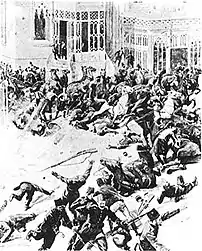Yıldız assassination attempt
A failed assassination attempted on Sultan Abdul Hamid II by the Armenian Revolutionary Federation at Yıldız Mosque took place on 21 July 1905 in the Ottoman capital Istanbul.[1] The Times described the incident as "one of the greatest and most sensational political conspiracies of modern times."[1]
| Yıldız assassination attempt | |
|---|---|
| Part of Armenian national liberation movement | |
 | |
| Location | Yıldız Mosque, Istanbul, Ottoman Empire |
| Date | 21 July 1905 |
| Target | Sultan Abdul Hamid II |
| Deaths | 26 (including the perpetrator) |
| Injured | 58 |
Background
The assassination attempt was motivated by the events of the Hamidian massacres and Sultan Abdul Hamid II's anti-Armenian policies.[2] Armenian resistance within the Ottoman Empire was planned by the Armenian national liberation movement, including the First Sassoun resistance of 1894, the First Zeitun Resistance in 1895, the Defense of Van in June 1896. The 1896 Ottoman Bank Takeover was the seizure of the Ottoman Bank on 26 August by members of the Armenian Revolutionary Federation in an effort to raise further awareness with twenty-eight armed men and women led primarily by Papken Siuni and Armen Karo who took over an enterprise largely employing European personnel from Great Britain and France.
%252C_Hovsep_(1830-1908)%252C_Kevork_(1839-1918)_pre_1895.jpg.webp)
Activity

Planning
The Armenian Revolutionary Federation planned the assassination attempt on the sultan to enact vengeance. Dashnak members, led by ARF founder Christapor Mikaelian, secretly started producing explosives and planning the operation in Sofia, Bulgaria. During planning, the explosives were made at the improvised bomb-making factory in the village of Sablyar, near the Bulgarian town of Kyustendil. Christapor Mikaelian, alongside his friend Vramshabouh Kendirian, died in an accidental explosion. Despite losing the instigators of the operation, it continued as planned.
Sultan Abdul Hamid Han would pray every Friday at the Yildiz mosque and would usually leave around the same time each time, creating a pattern in his movement. Taking advantage of this, the ARF planned to hide timed explosives in a carriage parked outside the mosque which were to explode at the time that Sultan Abdul Hamid Han would leave the mosque. It was decided that Zareh, a fedayee and participant in the Ottoman Bank takeover, would drive the carriage.
Attempt
On 21 July 1905, Zareh drove the carriage in front of the mosque. He set the timer for a planned 42 seconds. Sultan Abdul Hamid didn't show up on time because he got caught in a conversation with the Sheikh ul-Islam. The bomb was thrown at the Sultan but he escaped injury.[3] The bomb went off, killing many with it, including Zareh. The Sultan arrived a few minutes later than planned.[4]
26 members of the Sultan's service died. 58 from his service, as well as civilians in attendance, were wounded.
Aftermath
In the ensuing investigation other plots were unearthed.[5] Belgian anarchist Edward Joris was among those who were arrested and convicted.[1]
Scientific research
In June 2013 an international workshop about the incident was organized by the University of Antwerp.[6] The presentations were published in 2017 under the title To Kill a Sultan: A Transnational History of the Attempt on Abdülhamid II.[1]
References
- "To Kill a Sultan: A Transnational History of the Attempt on Abdülhamid II". Amazon. Retrieved 12 February 2017.
- Arman Kirakosian. The Armenian Massacres, 1894-1896: 1894-1896: U.S. media testimony - p. 33.
- Albert Shaw, The American monthly review of reviews, p. 280
- Assembly of Turkish American Associations (ATAA): Armenakan, Hunchaks and Dashnaktsutiun: Revolutionary Parties; Terror as Method. Nationalism Spreads From the Church to Secular Organizations
- Political Science Quarterly, Published 1905, v. 20 p. 774
- "The Assassination Attempt on Abdülhamid II". Academia. Retrieved 12 February 2017.
Bibliography
- Translated from the Armenian: Mihran Kurdoghlian, Badmoutioun Hayots, C. hador [Armenian History, volume III], Athens, Greece, 1996, pg. 48.
_p259_Sultan_Abdul_Hamid_II.jpg.webp)